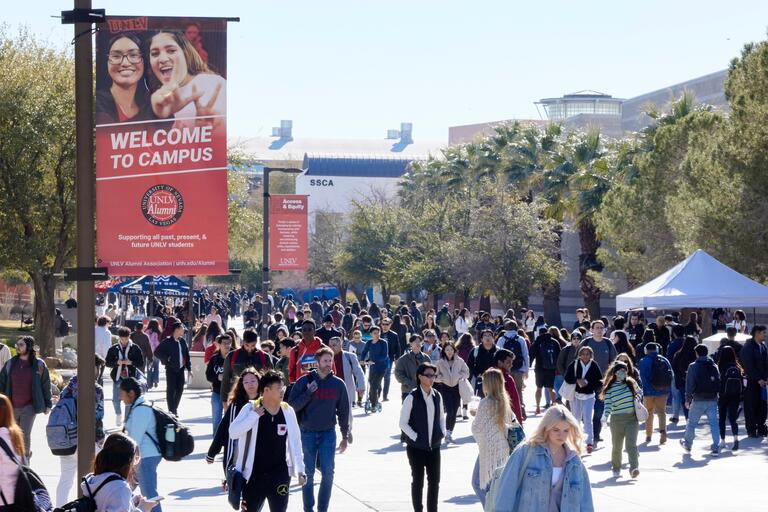The lounge at the new home for UNLV’s flourishing Honors College is always bustling.
In the heart of UNLV’s campus, some of the university’s brightest undergraduates are talking, engaging each other in ideas or culture or just chatting. But whatever it is, it’s clear the students are an inclusive bunch.
Honors College dean Marta Meana looks on with pride. The new space in the Beverly Rogers Literature and Law Building includes a quiet computer lounge, a socializing study hall and a smart classroom that doubles as a conference room. “We were trying to create spaces to allow interaction among students, and we’re thrilled with the result,” Meana said.
It appears to be working. Past the photo display of Honors College students slopping it up in a Tough Mudder race, the social lounge is packed. The space also has offices for Honors professors. The old space on the third floor of the Lied Library couldn’t hold the 735 Honors college students now enrolled, and it didn’t have room for professors.
“What we really love about it is we have the students and the faculty in the same place so it enhances the opportunity for interaction,” said Meana, who has overseen substantial growth in the college since she took over as dean in 2012.
Over the past four years, Honors College’s incoming class size has quadrupled, from 62 in 2012 to 272 this year, including 10 National Merit Finalists. And the average incoming unweighted GPA has also increased, from 3.7 three years ago to 3.85 this year.
“It means more and more high achieving students both in Southern Nevada and out of state are finding this to be a very attractive option for their college education,” Meana said.
The Honors program offers an alternate general education experience for undergrads. The curriculum includes wellness programs and small class sizes -- 16 to 24 high achieving students -- with top scholars and teachers from different disciplines. “When you combine 16 really bright students with a master scholar and teacher, what happens is magic,” Meana said.
The Honors program has been around since 1985 and has always been strong, but it has really come into its own the past few years. Meana and her team aggressively recruited local high schools to let students and counselors know that UNLV, and the Honors College, should be an option for them. “I went out with a confidence in what I believe is an amazing university. Now we feature prominently in high school students choices because we offer the equivalent of a private college experience right here at UNLV, with high quality professors at a really reasonable cost,” Meana said.
There’s no hard line requirement to make the program. Students have to complete a separate application that includes an essay and recommendation letters. While it helps to have a top GPA, a 3.4 won’t keep you out, the dean said. “If, for example, you’re a student who has shown amazing community leadership or, for example, you already have a patent for a mobile phone application, we will absolutely consider you."
Meanwhile, the number of out of state Honors College students has grown to almost 20 percent. But Meana won’t start recruiting heavily for out of state students because she wants to make sure she is capturing all of the potential in the valley first. ”Once I feel we’ve tapped out in the valley we will more actively recruit out of state. I feel first every high achieving student in Southern Nevada needs to know about the Honors College and what it has to offer,” she said.
Honors mathematics professor Bryan Bornholdt described UNLV’s honors program as a “very different model” than that at most other universities. In his first year at UNLV, the former Dixie State and Utah State University scholar said he was attracted to UNLV’s program specifically because it doesn’t have an elitist air about it. “What drew me here was the collaborative approach taken, where high performance is celebrated, but it’s got more of a humanist, whole person type of approach to educating.”
For senior history major and Truman Award winner Daniel Waqar, it was the Honors College that sold him on going to UNLV. Waqar said it was an AP U.S. Government teacher at his Las Vegas high school who told him to check out the Honors program, and he’s glad he did.
“There’s such a creative atmosphere here, where you don’t feel intimidated asking for help or going above and beyond in doing research or studying. Doors are always open here. And professors will spend two or three hours working with you. I don’t think you would get that at a Cal or Georgetown,” he said. “And I’m not hobbled by student loan debt like many of my friends who go to bigger universities.”
Like Waqar, Meana knows that high achieving high school students can go anywhere. “But if you’re going somewhere else because you don’t think there’s anything here for you, we're going to show you there is indeed a high-achieving option for you here in town.”



